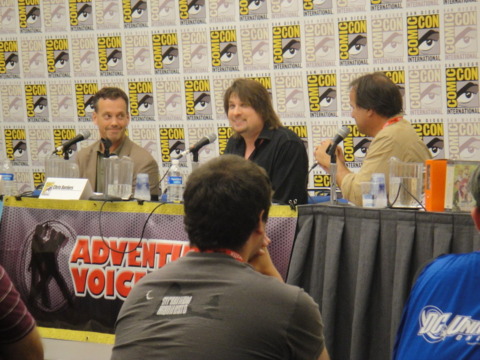Voice actors talk tips and tricks of their craft
Comic-Con 2011: Industry professionals share words of wisdom for aspiring voice actors.
Who was there: At the Comic-Con 2011 panel were video game voice-over director Chris Borders and voice actor Dee Bradley Baker, with voice actor Tony Oliver moderating.

What they talked about: After quizzing the panelists on their backgrounds, Oliver switched to character development and asked his two panelist how they process the hundreds of new characters that pass through their studios each year. As a director, Borders said the most important skill to develop is accurately identifying the core of a character. He could receive a character summary with too much, or too little, information, and it's his job to process that information and determine what the basics of that character are so he can relay that to the actors efficiently.
Baker added that, for the voice actor, the job is to diagnose, direct, and build the character on the spot without a lot of guidance--and to do this very quickly. Obviously, this isn't something one learns to do overnight; practice makes perfect. Knowing the general tone of the character's creator can also help the actor determine how the character is intended to be portrayed.
Borders took this notion a step further by saying that a great voice actor, or director, has an understanding of all media, even if it's not what they're into personally. Oftentimes writers will use other characters as reference points in their instructions, "like Michelle Rodriguez from Lost," and they need to know who that is and what it means. They may not be a fan of Twilight or Harry Potter, but they can't parody them without being familiar with those series.
When asked to give advice for aspiring members of the voice-over industry, Baker stressed the importance of having a background in acting. Most of the voice actors he knows come from live performance backgrounds of one form or another. Borders offered some additional advice by challenging would-be voice actors to pull out a large book and just start reading aloud. "If you don't like that," Borders said, "then you won't like being a voice actor."
On the topic of what separates a professional voice actor from an amateur, Borders noted that professionals can absorb and adapt a new script quickly. A professional may need only five takes to get a line right, while an amateur may need more than 20. Being able to control the full range of one's voice and pace oneself in the studio is also key, as the actor may be expected to scream nonstop for hours on end.
Bakers' advice focused on handling criticism. It's the voice actor's job to find what the character needs, he said, and sometimes this may take a while, especially if the director isn't sure what he or she wants from that character. A voice actor may be asked to read the same line over and over with dozens of different inflections, but the actor should never take this personally. The actors have to be OK with criticism, since they are being paid for their confidence.
Quote: "There are not a lot of huge egos in the voice-over industry."--Chris Borders on the voice-over industry.
"You've got to connect with the things that you love."--Dee Bradley Baker on pursuing dreams.
Takeaway: A great voice actor is a diverse voice actor. Even if the actor isn't a fan, studying and absorbing the latest in pop media is essential to being prepared for whatever the actor is being asked for. Once that knowledge is achieved, it's then necessary to hone one's skills with some live stage performance--not to mention make some money. From there, just keep an open mind and a healthy reserve of energy, and success is possible.
Got a news tip or want to contact us directly? Email news@gamespot.com
Join the conversation